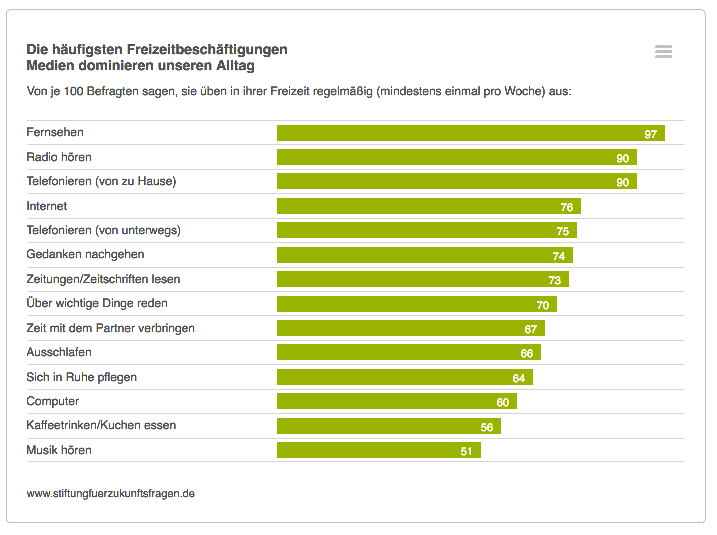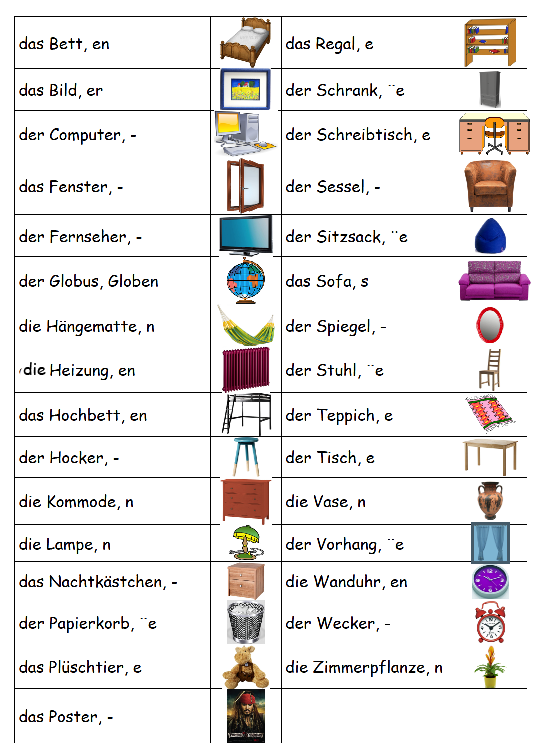| Seite 9 |
Likes and Dislikes
Likes and Dislikes Overview
Degrees and dimensions of favor and disfavor for all things can be highly expressive and nuanced.There is no generic "to like" in German as there is in English, although the verb mögen is coming ever closer in its colloquial uses (probably influenced by English). Here are a few verbal constructions that are used in German to express likes and dislikes:
| Verbal constructions | |
|---|---|
| gern + verb | nicht gern + verb |
| gern haben | nicht gern haben |
| mögen | nicht mögen |
| gefallen | nicht gefallen / mißfallen |
| lieben | hassen |
| schmecken (food and drink) | nicht schmecken |
|
Übung 1-9a. "Was macht Spaß?" Check off the things you think are fun (Spaß machen) Related exercise in BOLT.
- Check off five things you find fun or that you like to do. If you cannot find five things that appeal to you, then pretend you like to do something.
- Ask three people if they like to do something. Use only German!
- For each person, note down a) name (Wie heißt du?) b) one thing they like to do and c) one thing they do not like to do.
- Report to the group what all three like and not like to do.
| Frage (question) | Antwort (answer) |
|---|---|
| Ich spiele Golf gern. Spielst du Golf auch gern? | Nein, ich spiele Golf nicht gern. |
| Ich gehe gern joggen. Gehst du auch gern joggen? | Ja, ich gehe auch gern joggen. |
| Was machst du gern? | Ich spiele Tischtennis gern. Und du? |
| Was machst du nicht so gern? | Ich spiele Schach nicht so gern. |
|
|
Name: _________________________________
Was er/sie gern macht: ___________________________________________________________________
Was er/sie nicht gern macht: _____________________________________________________________
Name: _________________________________
Was er/sie gern macht: ___________________________________________________________________
Was er/sie nicht gern macht: _____________________________________________________________
Name: _________________________________
Was er/sie gern macht: ___________________________________________________________________
Was er/sie nicht gern macht: _____________________________________________________________
oft, viel, gut, schlechtThe same principle of negation applies here as with gern: Spielst du oft Tennis? → Nein. Ich spiele nicht oft Tennis. |
Übung 1-9b. "Spielst du Fußball?" Ja, ich spiele oft Fußball. (Nein, ich spiele Fußball nicht so oft.) Review the activities listed on "Seite 7" and those listed in the exercise Übung 1-8b. Wochenplan: Uni und Freizeit on "Seite 8". Take turns asking your partner whether she / he does these things. Respond with a complete sentence, stating "oft, nicht oft, nicht so oft, viel, nicht viel, gut, nicht so gut, schlecht".
| Meine Partnerin / Mein Partner heißt... | Aktivität | oft, viel, gut, schlecht... |
|---|---|---|
|
| ||
|
| ||
|
|
Culture Notes: Leisure in GermanyThe list below is representative: television, radio, and computer dominate. Germans are avid readers of newspapers and magazines. Germans tend to seek peace and quiet in the pastime pursuits, rather than adventure or sports, although German young people are very active in athletics. Personal development (educational activities, new skills, artistic pursuits, etc.) often ranks high. And Germans do love to travel, as well. By far the favorite vacation sites are beaches, especially in Spain and Italy. Although going out to eat is often listed as an important leisure activity, bars and drinking are rarely mentioned. That is because Germans regard alcoholic drinks more often as a food rather than as a drug. The graph below also lists "coffee and cake" as a popular activity. This represents a special German popular tradition of the afternoon coffee break with "Kuchen", which is a little like a coffee cake or large fruit pastry. | |

| |
|
Übung 1-9c: Was ist in meinem Zimmer: Kartenspiel
Übung 1-9d Basic Word Order in German The verb must always be second. The subject may come right before the verb or right after the verb. Answer the questions in German. Begin each sentence with the answer to the question.
Beispiel:
___________________________________________________________________________________________ ___________________________________________________________________________________________ ___________________________________________________________________________________________ ___________________________________________________________________________________________ ___________________________________________________________________________________________ ___________________________________________________________________________________________
|
